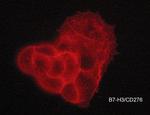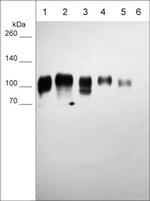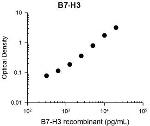Search Thermo Fisher Scientific
FIGURE: 1 / 3
B7-H3 (CD276) Antibody (MA5-47649) in ICC/IF



Product Details
MA5-47649
Species Reactivity
Host/Isotype
Class
Type
Clone
Immunogen
Conjugate
Form
Concentration
Purification
Storage buffer
Contains
Storage conditions
Shipping conditions
RRID
Product Specific Information
Clone M045 mouse monoclonal antibody detects a 100-120 kDa* protein on SDS-PAGE "Native" or denatured immunoblots of human LNCaP, MCF-7, NCI-H28, A431, and MDA-MB-231 carcinomas. The antibody detects B7-H3 in membranes and cytoplasm in MCF7 cell after immunocytochemical labeling. The antibody works for western blot, immunoprecipitation, immunocytochemistry, and ELISA capture.
Target Information
CD276 is a member of the B7 family of co-stimulatory molecules also known as B7-H3. CD276 is a type I transmembrane protein that induces the proliferation of CD4+ and CD8+ T cells, enhances the generation of cytotoxic T cells and selectively stimulates the production of interferon gamma. Expression of CD276 can be induced on dendritic cells and monocytes by inflammatory cytokines, and is also widely expressed in peripheral tissues including the heart, kidney, testis and colon. In humans, CD276 exists as two isoforms which result from gene duplication and differential splicing. CD276 is reported to have therapeutic potential for the regulation of cell-mediated immune responses to cancer, particularly in conjunction with anti-angiogenic therapy.
For Research Use Only. Not for use in diagnostic procedures. Not for resale without express authorization.
References (0)
Bioinformatics
Protein Aliases: 4Ig-B7-H3; B7 homolog 3; B7-H3; CD276; CD276 antigen; Costimulatory molecule; sB7 H3; sB7H3; sCD276; soluble B7 H3; soluble B7H3; soluble CD276
Gene Aliases: 4Ig-B7-H3; B7-H3; B7H3; B7RP-2; CD276; PSEC0249; UNQ309/PRO352
UniProt ID: (Human) Q5ZPR3
Entrez Gene ID: (Human) 80381

Performance Guarantee
If an Invitrogen™ antibody doesn't perform as described on our website or datasheet,we'll replace the product at no cost to you, or provide you with a credit for a future purchase.*
Learn more
We're here to help
Get expert recommendations for common problems or connect directly with an on staff expert for technical assistance related to applications, equipment and general product use.
Contact tech support
